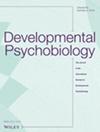Intrinsic Infant Hippocampal Function Supports Inhibitory Processing
Abstract
Impaired cerebral inhibition is commonly observed in neurodevelopmental disorders and may represent a vulnerability factor for their development. The hippocampus plays a key role in inhibition among adults and undergoes significant and rapid changes during early brain development. Therefore, the structure represents an important candidate region for early identification of pathology that is relevant to inhibitory dysfunction. To determine whether hippocampal function corresponds to inhibition in the early postnatal period, the present study evaluated relationships between hippocampal activity and sensory gating in infants 4–20 weeks of age (N = 18). Resting-state functional magnetic resonance imaging was used to measure hippocampal activity, including the amplitude of low-frequency fluctuations (ALFFs) and fractional ALFF. Electroencephalography during a paired-stimulus paradigm was used to measure sensory gating (P50). Higher activity of the right hippocampus was associated with better sensory gating (P50 ratio), driven by a reduction in response to the second stimulus. These findings suggest that meaningful effects of hippocampal function can be detected early in infancy. Specifically, higher intrinsic hippocampal activity in the early postnatal period may support effective inhibitory processing. Future work will benefit from longitudinal analysis to clarify the trajectory of hippocampal function, alterations of which may contribute to the risk of neurodevelopmental disorders and represent an intervention target.

 求助内容:
求助内容: 应助结果提醒方式:
应助结果提醒方式:


